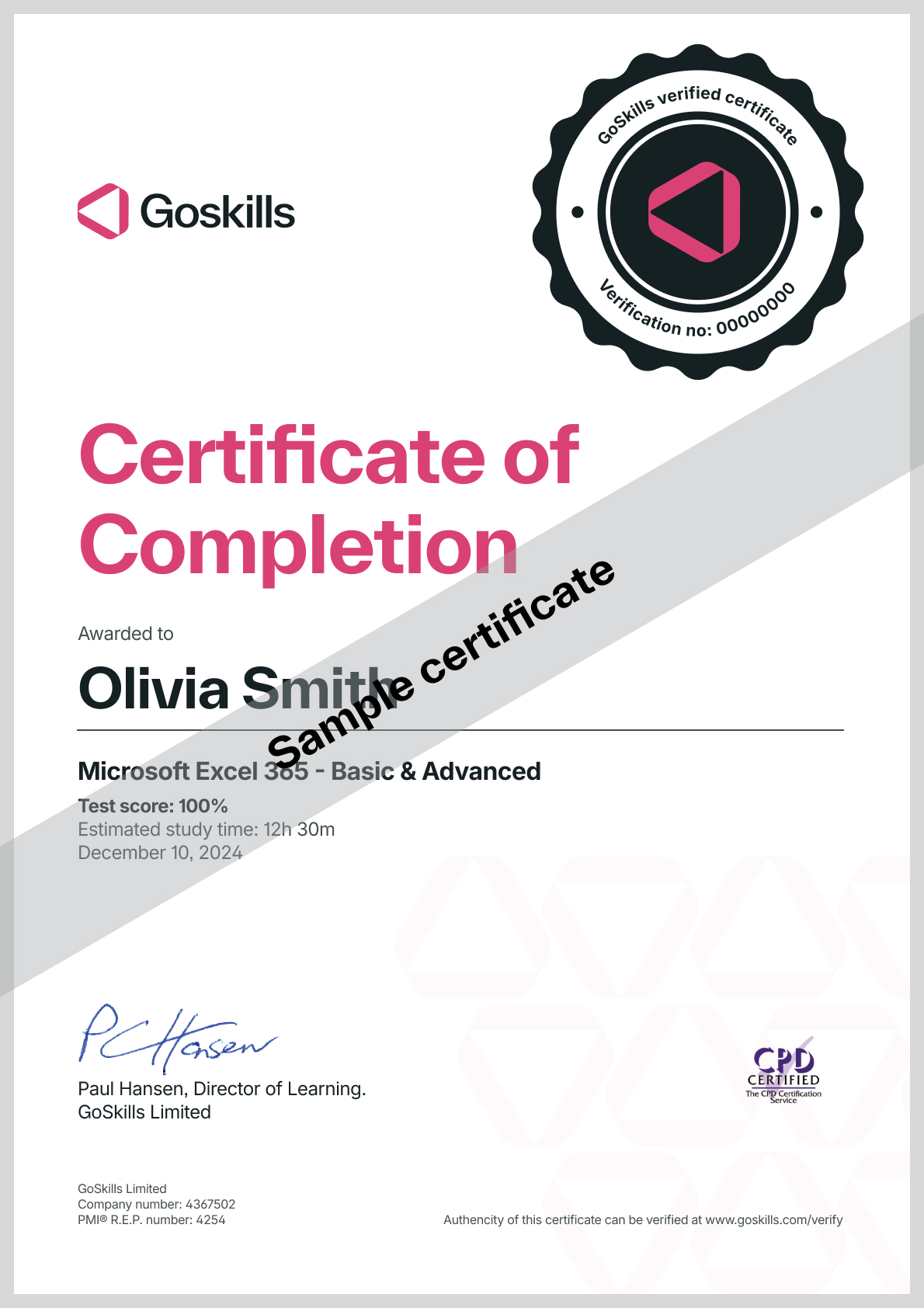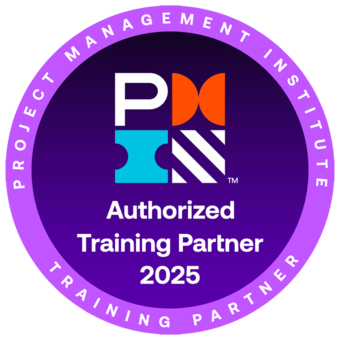CAPM Certification Training
CAPM Certification Training
Skills you’ll gain
The definitive guide to CAPM certification success
The GoSkills CAPM® Certification Training course is the ultimate resource for passing the CAPM exam — whether you’re taking it for the first time, renewing your certification, or upskilling your team.
Led by industry expert and Harvard Business Review author Ray Sheen, this comprehensive course covers every process group and knowledge area included in the exam, fully aligned with the PMBOK® Guide 7th Edition and the latest CAPM exam updates.
By the end of the course, you’ll be ready to approach the CAPM exam with confidence.
Here’s what to expect:
- Step-by-step guidance through the CAPM application process
- Everything you need to know about scheduling your exam and achieving a passing score
- Practical insights to excel as a valuable member of any project management team
- Comprehensive exploration of the key principles of both traditional and agile project management
- In-depth analysis of the ten project management knowledge areas, including scope, cost, quality, and resources, and how they work together
- Strategies to leverage PMI resources alongside this course for maximum success
This course also provides 26 project management education hours (PDUs), making it a valuable option for maintaining your certifications. As a PMI Authorized Training Partner (ATP), GoSkills guarantees top-tier quality and expertise every step of the way.
Syllabus
Download syllabus-
1
Project Phases Projects are often organized into phases. Phases provide structure and logic to the project and aid the project team and management to track progress. 6m
-
2
Progressive Elaboration Progressive elaboration is the principle of steadily adding detail to the project plan as more information becomes available. 5m
-
3
Baseline Plan The integrated project plan that includes scope, schedule, and resource information for all aspects of the project is the project baseline plan. 6m
-
4
Change Planning The unique nature of projects leads to an inherent level of uncertainty. Project managers should expect and plan for project change. 5m
-
5
Project Charter The Project Charter is the document that approves the initiation of the project and identifies goals, objectives, boundaries, and constraints. 5m
-
1
Product Lifecycle The four phases of the product lifecycle describe business impact of a product line. Business analysts and project managers use the product lifecycle when setting project goals and objectives. 5m
-
2
Product Roadmap The product roadmap sets expectations for product development projects. 4m
-
3
Product Verification and Validation Verification and validation are critical elements in a product development project. Verification shows that the product meets requirements and validation shows that the product does what the customers need it to do. 6m
-
4
Projects and Business Analyst Business analysts participate in projects by assisting in setting requirements and testing the result. The manner in which they do this will change based on the project management methodology. 4m
-
1
Stakeholders The Project Stakeholders' support is essential for project success. Project Stakeholders set the goals for the project and will ultimately determine whether the project is considered a success or failure. 4m
-
2
Stakeholder Identification Identifying stakeholders enables the project team to create a strategy for each that guides the communication and interaction with each stakeholder. 4m
-
3
Stakeholder's Project Goals Many stakeholders have additional goals for a project beyond the primary business goal. Understanding those goals can help the team ensure project success and maintain stakeholder support. 6m
-
4
Project Boundaries Learn how to quickly identify project boundaries using the W questions. 5m
-
5
Requirements Planning Project requirements are often vague, incomplete, or contradictory at the time of project initiation. Normally, additional effort is required to collect and verify the true project requirements. 4m
-
6
Requirements Management Project requirements are often vague, incomplete or contradictory at the time of project initiation. Normally, additional effort is required to collect and verify the true project requirements. 5m
-
1
Project Deliverables Learn how to identify project tasks and activities using the deliverables deployment technique. 4m
-
2
Task Description Task Descriptions are the statements of scope for each of the project activities. They are written in the format of “action – completion point.” 3m
-
3
WBS Dictionary The WBS Dictionary is a table or spreadsheet that is organized by project task and contains all project planning details. 4m
-
4
Work Breakdown Structure The Work Breakdown Structure (WBS) is the most commonly used technique for organizing the project scope. The WBS decomposes the scope into tasks and organizes the tasks into logical groupings. 6m
-
5
Milestone Schedule Understand when and how to use a milestone schedule on a project. Learn how to create a milestone schedule. 3m
-
6
Gantt Chart Understand when and how to use a Gantt chart on a project. Learn how to create a Gantt chart. 6m
-
7
Network Diagram A network diagram is a project scheduling technique that shows the relationship between tasks by depicting project activities as a flowchart. 5m
-
8
Critical Path Critical Path is a project scheduling technique that determines the shortest time that the current project plan can be completed. 5m
-
9
Float, Slack, Buffer Float (slack or buffer) is extra time that a task could consume beyond its duration estimate without impacting other aspects of the project. Total float is extra time without impacting the end date of the project and free float is extra time without impacting another project task. 6m
-
10
Estimating Techniques The most commonly used techniques for creating project estimates are analogous estimates, bottom-up estimates, three-point estimates, and using a parametric model. 5m
-
11
Project Budget Understand what is normally shown in a project budget. Learn how to create a time-phased project budget. 6m
-
12
Resource List The project Resource List is a list of all individuals working on the project with their contact information and all special equipment and facilities required to accomplish project tasks. 3m
-
1
Project Leader The Project Leader is responsible for ensuring the project team executes the project. 6m
-
2
Core Team Most large projects are managed by a cross-functional core team. Core team members have a dual responsibility; they are responsible for the project achieving its goals and they are responsible to ensure that the project complies with their function’s standards and best practices. 6m
-
3
Responsibility Matrix The Responsibility Matrix is a project management tool for correlating project work assignments with project team members. 3m
-
4
Team Meetings Team Meetings are a gathering of team members to discuss aspects of the project. Team pulse meetings focus on status. Team problem-solving meetings focus on problem resolution. 4m
-
5
Sprint - Scrum Team The Scrum Team performs the project work conducted during a Sprint on an Agile/Scrum project. 5m
-
1
Estimating Uncertainty Project plans are built with an accumulation of estimates, each of which has a level of uncertainty associated with it. The level of uncertainty is a major contributor to the accuracy of the plan and the amount of project risk. 5m
-
2
Issue Resolution Issues are any request, complaint, or unexpected condition that leads to unplanned, but in scope, work that must be accomplished on a project. They normally result in the need to implement a workaround in order to resolve them. 4m
-
3
Positive and Negative Risk Understand the difference between positive and negative risk. Learn the major steps of project risk management. 5m
-
4
Risk Register The Risk Register is a table that tracks the project risk management activities. 4m
-
5
Risk Identification Risk Identification is the practice of identifying positive and negative conditions that may occur within the project and impact project objectives. 5m
-
6
Risk Matrix All project risks are not equal in their effect on a project. Project risks that have been identified are prioritized using qualitative techniques such as the Risk Matrix. 5m
-
7
Negative Risk Response Negative Risk Response is determining what actions the project will take to address risk threats. 6m
-
8
Positive Risk Response Positive Risk Response is determining what actions the project will take to address risk opportunities. 5m
-
9
Contingency and Triggers Contingencies are potential risk response actions that will only be implemented if some triggering event or condition has shown that the risk probability has gone from unlikely to likely. 4m
-
1
Quality Control - Quality Assurance Quality management on projects are processes and tools that aid the project core team and the organization in their effort to both do the right things and do things the right way on projects. It includes a focus on both corrective actions and preventive actions. 7m
-
2
Project Dashboards Learn how to create and use a project dashboard to communicate project status with both management and your project team. 4m
-
3
Management Meetings Project Management Reviews are the formal documented meetings held periodically between senior management and the project team. 4m
-
4
Technical Reviews Project technical reviews are formal decision meetings between team members and a panel of subject matter experts. 4m
-
5
Project Change A formal documented modification to the project baseline, boundaries, or an artifact. 6m
-
1
Scrum Process The Agile/Scrum methodology is a structured project management methodology. It follows a prescribed process that includes Sprints and Scrums. 4m
-
2
Story Cards Story Cards - also known as Product Backlog Items (PBIs) - are the technique used for documenting project scope, quality requirements, estimates, and priority of the deliverables in an Agile/Scrum project. 3m
-
3
Backlog Requirements are managed in an Agile project using the Project Backlog. This is a prioritized list of the project deliverables. 4m
-
4
Sprint Planning - Part 1 The first portion of the Sprint Planning meeting consists of selecting the Sprint Backlog and clarifying Stories. 6m
-
5
Sprint Planning – Part 2 The second part of the Sprint Planning meeting is the time when detailed planning takes place by the Scrum Team and the Sprint is actually initialized. 4m
-
6
Prioritizing the Backlog The Product Owner must regularly prioritize the Story Cards that make up the Product Backlog and at the beginning of a Sprint he or she must prioritize the Story Cards selected for the Sprint Backlog. 6m
-
7
Release Planning Release planning allows the Product Owner to manage the rollout of capability in order to obtain feedback and assess progress. 5m
-
1
Sprint Execution Sprint execution is the actual work of the Scrum team during the Sprint to accomplish the tasks needed to complete each Story in the Sprint Backlog. 5m
-
2
Scrum Meetings During a Sprint, the Scrum Team meets daily at a Scrum Meeting to provide status on progress. 7m
-
3
Roadblocks Roadblocks are impediments that prevent the Scrum Team from completing Stories and tasks. The Scrum Master is charged with removing or creating a workaround for the Roadblocks. 6m
-
4
Sprint Demonstration The Sprint Demonstration is the formal meeting where the Scrum Team demonstrates to the Product Owner the performance of each deliverable that was created during the Sprint. 4m
-
5
Sprint Demonstration Planning Sprint Demonstration Planning ensures that the Sprint Demo meeting appropriately reflects the work accomplished by the Scrum Team. 6m
-
6
Refinement The Backlog Refinement is the update of the Product Backlog based upon what has been completed and what has been learned in a recently completed Sprint. 3m
-
7
Retrospective The Sprint Retrospective is a lessons learned meeting with a focus on identifying opportunities to improve the performance and management of the next Sprint. 4m
Certificate
Certificate of Completion
Awarded upon successful completion of the course.

Instructor
Ray Sheen
Ray is a certified Project Management Professional (PMP) with the Project Management Institute, a certified Scrum Master with Scrum Alliance, and certified Lean Six Sigma Black Belt with IASSC. He is a member of the Project Management Institute and the Product Development Management Association.
He is president and founder of Product & Process Innovation, Inc. and is a veteran business leader with over 25 years of executive, project management, and engineering management experience. Ray has worked in several industries including aerospace, electrical distribution and utilities, biotechnology, appliances, electronics, machining, medical devices, pharmaceutical, automotive, and financial services. He has held executive management positions in a Fortune 500 company and has been involved in entrepreneurial startup organizations.

Ray Sheen
Project Management Instructor & Author
Accreditations
Link to awards The PMI ATP seal, PMI, PMP, CAPM and PMBOK are registered marks of the Project Management Institute, Inc.Frequently asked questions
We’ve compiled the most important information to help you get the most out of your experience. Can’t find what you’re looking for? Contact us.
Who is this course for?
This course is ideal for anyone who wants to prepare for the CAPM exam, whether it is your first time getting certified or you are retaking the exam to maintain your certification.
This course is geared specifically to prepare you for the CAPM exam, so if you need a refresher on the basics of project management, try our CAPM Foundations course first. Combined with the CAPM Certification Training course, this powerful duo will prepare you to ace your exam with flying colors.
Does this course provide project management education hours or PDUs?
Yes, the GoSkills CAPM Certification Training course provides 26 project management education hours, or 26 PDUs to maintain your certification. This surpasses the CAPM certification requirements of at least 23 hours of project management education. GoSkills is a PMI Authorized Training Partner (ATP).
Is it worth getting a CAPM certification?
Gaining a CAPM certification can enhance your career options and even boost your salary. Not only will you learn how to better work within a project team and improve your project management skills, CAPM is an industry recognized certification worldwide. As CAPM is suitable for individuals without a lot of project management experience, it’s a great way to get your foot in the door by proving your expertise to employers.
How do I become CAPM certified?
- Meet PMI’s prerequisites for CAPM certification of:
- Secondary degree (high school diploma, associate’s degree or global equivalent)
- 23 hours of project management education completed by the time you sit for the exam (this course provides 26 hours of project management education).
- Study for the CAPM exam.
- Take an online course like GoSkills’ CAPM Certification Training course, complete with exercises and quiz questions to test your knowledge. It is also helpful to review PMI’s CAPM Handbook, and the PMBOK® Guide—Sixth Edition.
- Pay the PMI CAPM exam fee and take the CAPM exam.
- This can be an in-person Center-based exam, or an online proctored exam.
- The exam has 150 questions, and you have three hours to complete it.
- Maintain your certification by retaking the exam every five years.
Is there a work experience requirement for CAPM?
As of August 28, 2019, PMI has removed the work experience requirement. Prior to this change, PMI required 1500 hours of work experience to qualify.
How much does a CAPM make?
Your CAPM certification can help you demonstrate your expertise and value to employers, and boost your salary. Project managers who hold a CAPM certification can earn more than their non-certified colleagues. According to recent PayScale data, the average salary for a CAPM certification holder in the United States is $66,000. As CAPM is an entry-level certification, the more practical experience you gain will help set you up for more lucrative positions.
Which certification is better, CAPM or PMP?
It is not necessarily about which certification is better, but rather which is more suitable for you at this stage of your career.
The PMP certification is suitable for more experienced project managers who already have 3-5 years of experience leading projects, a secondary degree or four-year degree (this varies depending on your years of project management experience), and 35 hours of project management education.
If you meet these requirements, we would recommend you go for the PMP certification, and prep for the exam with the GoSkills PMP® Certification Training course. As the prerequisites are more advanced, the exam topics are more in-depth than for CAPM.
The CAPM certification is ideal for individuals without a lot of project management experience wanting to kickstart their careers and showcase their knowledge to potential employers. If you are new to project management or you do not yet have the necessary work experience, CAPM is a better choice to build up your credentials.
Once you have obtained your CAPM certification, you can gain more project management experience and take the PMP exam at a later date if you choose to.
Is GoSkills a PMI ATP?
GoSkills is a member of the PMI ATP Program. To earn the PMI Authorized Training Partner designation, a provider must meet rigorous standards for quality and effectiveness. By training with GoSkills, you can be confident that your course content and instructors meet the highest quality standards.
Do you have other online project management courses?
GoSkills offers a range of project management courses online. All of our project management courses allow you to earn contact hours and PDUs to put towards certification with PMI.
Can I use GoSkills for team training?
Yes! GoSkills works with teams of all sizes. You’ll get:
- Full access to our course library
- Easy-to-use admin tools and reporting
- No contracts, no minimums, and transparent pricing
Learn more about team training
How GoSkills helped Chris
I got the promotion largely because of the skills I could develop, thanks to the GoSkills courses I took. I set aside at least 30 minutes daily to invest in myself and my professional growth. Seeing how much this has helped me become a more efficient employee is a big motivation.



